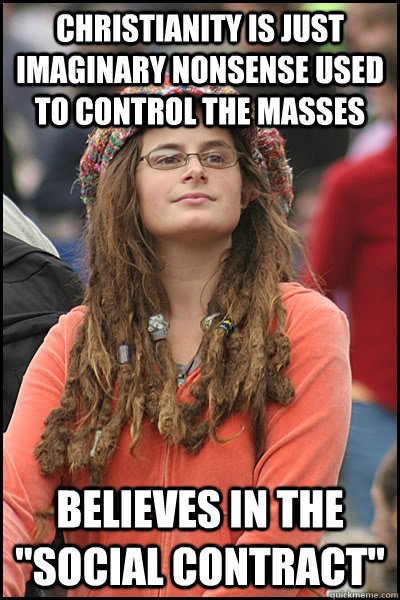That idea has since been discarded, but the ever-so-popular "social contract" has replaced it despite being based on the same metaphysical bullshit.
This time, it's not God who has appointed our wise overlords, but "we the people" through an electoral process we've had no hand in shaping or creating. We are simply born into the system and expected to obey.
Originating during the Age of Enlightenment, the social contract "addresses the questions of the origin of society and legitimacy of the authority of the state over the individual."
Fortunately, we've come a long way since the Enlightenment.
For starters, we know that society is a result of purposeful human action, that is, economics. Just like how you can ignore physics and the Earth will keep spinning around the sun, many people can, and do, ignore praxeological economics despite how free markets obviously work better than government bureaus.
As far as the "authority of the state over the individual," must be addressed, it can mean a couple things. First, the "state" can be interpreted to mean the violent sphere of society, as no matter how peaceful people are, there will always be murders, thefts, and frauds.
Insofar that there is an authority to enforce peaceful relations and settle disputes, given our knowledge of economics, the "state" could mean a multitude of privately-owned organizations that rely on actual contracts signed by clients of said legal and/or security services.
The second definition, and more commonly-used, is that the "state" is the tribe.
Since the dawn of man, the tribe has had authority over the individual. It's only natural, since, working together with the group meant a larger probability of staying alive. For most of human history, we'd had to survive the harsh elements of nature, including, but not limited to, weather and predators.
But as markets developed and capital accumulation occurred, it became apparent that Ricardo's "law of association" was valid for all peoples in all times in all places.
Simply, it is advantageous for human beings to peacefully work together and trade, in contrast to all-out war and theft. If the goal is a higher standard of living, it makes more sense to rely on mutual exchange than the orders of the tribe leader.
The "social contract" does not obey Ricardo's law. Consent is tacitly implied, leading to some egregious abuses of power.
The starting point for social contract theories is an examination of the human condition absent from any political order. This is often called the "state of nature."
It is presumptuous, however, since any human organization, even among two or three people, implies politics. We are, after all, as Aristotle said, the political animal. When Friday joined Robinson Crusoe on his island, someone had to take charge if a dispute arose.
Of course, the "state of nature" could apply to Crusoe and Friday, as both are bound only by their personal power and conscience. The social contract theorist must demonstrate how a rational individual would voluntarily consent to give up his or her natural freedom to obtain the benefits of a political order.
For praxeologists, this is simple: contracts.
There is no ambiguous "social contract" that binds insurance companies to individuals, nor managers to their employees. In nearly all realms of human action, there are physical contracts that are voluntarily signed and enforced through dispute settlements and resolutions.
While many philosophers have long debated about the origin and nature of the "social contract" and natural rights, most of these thinkers lived in the 17th and 18th centuries. And while ideas from 200+ years ago shouldn't be disregarded for the mere fact that they are old, new ideas and insights should be included when formulating the nature of political authority.
In other words, unless one has good reasons to denounce praxeology, knowledge of human action must be taken into account if one is going to formulate a social contract theory. Unfortunately, these 17th and 18th-century philosophers did not have the insights of Ludwig von Mises and other "Austrian" economists.
John Locke believed we had natural rights that were inalienable, that the rule of God superseded state authority. Others like Jean-Jacques Rousseau believed that self-rule (through the democratic state) was the best way of ensuring the general welfare while maintaining individual freedom.
But all these theories imagined that there was some objective "rule of law" above and beyond human beings. There isn't. Normative ethics ("what oughta be") are not akin to positive sciences ("what is," i.e. human action, chemistry, physics, etc.).
Locke can't prove that we possess natural rights any more than he could have proved God. But likewise, Rousseau's attempt to legitimatize the democratic state fails on both empirical and logical grounds.
Someday, people will look back at this point in history and wonder "what in the hell was wrong with those people?"
Like nowadays, how we look at historic slave-owning societies and think "WTF?"
Someday, the obvious answer will be obvious.
An unwritten tacitly-implied "social contract" is not legitimate. Especially in a society that claims to be rational and built on the precepts of peace, fairness and order.
Social contract theorists must demonstrate how rational individuals voluntarily consent to give up their natural freedom to obtain the benefits of a political order.
Without mutual exchange, this cannot be done.


this article was a good read. it helped me think of a different perspective. i think a lot would like to contradict the view but it does not hurt to be open to more than there is offered
ReplyDelete